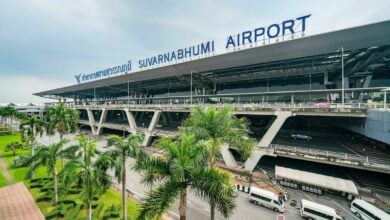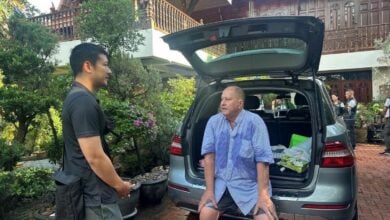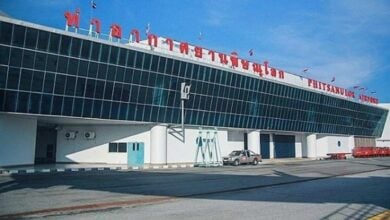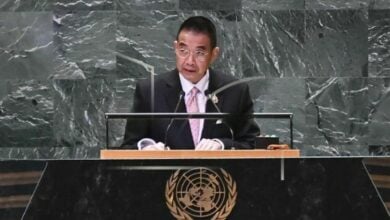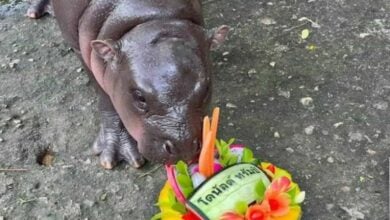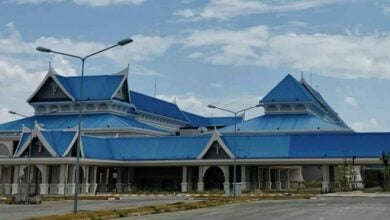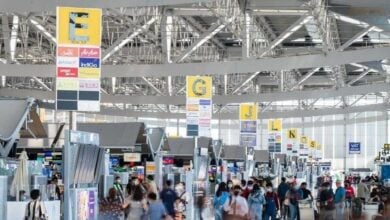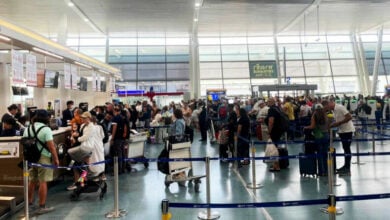World News
Explore the latest global news with The Thaiger’s World News page, your comprehensive source for international updates. We’ve got breaking news, insightful analysis, and exclusive stories from around the globe, covering politics, business, technology, and culture. Stay informed about the world’s most pressing issues, emerging trends, and influential events, as well as updates on travel, lifestyle, and entertainment.
The Thaiger is your go-to platform for staying connected with the ever-changing world we live in. To keep up with the most reliable international news source, subscribe to our newsletter and follow us on social media.
-
 Sponsored
Sponsored A healthy tomorrow starts today: Celebrate the great American Smokeout day
The Great American Smokeout, held this year on November 17, is a nationwide event that encourages smokers to take their first steps towards a smoke-free life. If you’re an expat in Thailand, this day could be a timely reminder to...
-

High ambitions: Suvarnabhumi aims to triple transit traffic by 2030
Suvarnabhumi Airport, Thailand’s busiest international gateway, is gearing up for a major transformation to become Southeast Asia’s ultimate transit hub. Airports of Thailand (AOT) plans to raise the airport’s transit flights from a mere 4% to a soaring 20% as part of an ambitious master plan to rank among the world’s top 20 airports by 2030. This bold goal is…
-

Thai Airways cash turbulence: Will shareholders give a capital lift-off?
In a dramatic twist, shareholders of Thai Airways International (THAI) are in a heated debate over whether to pump more cash into the airline, despite its recent financial turnaround. With a shiny rehabilitation plan in place, which includes a bold proposal for capital injection, the airline’s comeback story is under the microscope. Central to this saga is the question of…
-

Naked intruder found living under Los Angeles home for six months
A woman discovered an unexpected intruder living beneath her Los Angeles home for approximately six months. The 93 year old found a naked man hiding in a small underground space, prompting police intervention to remove him. Despite efforts involving police dogs and tear gas, the man resisted leaving. Police identified the man as 27 year old Isaac Betancourt, who was…
-

Suvarnabhumi soars as UNESCO’s most beautiful airport (video)
In a triumph for Thai architecture, Suvarnabhumi International Airport has been hailed by UNESCO as one of the top six most beautiful airports globally for 2024. But that’s not all, the airport’s SAT-1 building has also bagged a nomination for the prestigious Prix Versailles Award for the most stunning airport design on the planet, with results set to be revealed…
-

Thai Airways joins backlash against Rolls-Royce delays
Thai Airways (THAI) is fed up with Rolls-Royce, joining a growing backlash over delays in jet engine maintenance that’s forcing its fleet into prolonged downtime. CEO Chai Eamsiri has revealed that the airline’s Boeing 787 Dreamliners are now waiting up to 120 days for engine maintenance, a stark increase from the previous 90-day standard—a time frame he already considered frustrating.…
-

DHL Thailand’s new multimodal hub to revolutionise logistics
DHL Global Forwarding Thailand is upping the ante in the logistics game with the launch of its brand-new International Multimodal Hub in Bangkok, a 480-square-metre facility at Suvarnabhumi Airport’s Free Zone 3. This cutting-edge hub not only positions Thailand as a logistics powerhouse in Southeast Asia but also offers seamless connections across road, air, and sea, streamlining the entire supply…
-

Suvarnabhumi Airport to offer early check-in by February
Suvarnabhumi International Airport is set to introduce an early check-in service, allowing passengers to complete their check-in process up to 24 hours before departure. This initiative, announced on the Transport Ministry’s social media platform, is aimed at enhancing traveller convenience and reducing congestion at Thailand’s primary international gateway. Airports of Thailand (AoT) President Kerati Kijmanawat indicated that the service is…
-

Pilotless ‘air taxis’ takes first flights above Bangkok (video)
Chinese aviation tech company EHang made history by launching its EH216-S pilotless electric vertical take-off and landing (eVTOL) aircraft in Thailand. The debut passenger flights, held at the Thailand Drone Exhibition & Symposium 2024, mark a major milestone as Thailand becomes the 18th country to host EHang’s futuristic eVTOL flights. With the Civil Aviation Authority of Thailand (CAAT) leading the…
-

THAI union fights to keep government out of airline’s rehab plan
Thai Airways International (THAI) staff are up in arms, rallying against what they see as an attempt by the government to seize control of the airline under the guise of a rehabilitation plan amendment. The airline’s labour union staged a peaceful but determined protest outside THAI headquarters yesterday, November 8, holding up placards and calling on creditors to reject the…
-

Scottish pervert hiding in Thailand for 40 years extradited and jailed
In a landmark case for Scottish police, a pedophile who fled to Thailand has finally been jailed, decades after committing a series of horrifying sexual crimes against children. The deviant Scotsman, 74 year old John Martin, was extradited from Bangkok to Scotland in December last year, facing justice at last for historical abuse offences uncovered by a painstaking investigation led…
-

Phuket Airport boosts efficiency with facial recognition technology
Phuket Governor Sophon Suwannarat made an appearance at Phuket International Airport yesterday, November 8, marking a significant advancement in passenger processing through the launch of facial recognition technology. This initiative aims to streamline procedures and cut down on wait times for travellers. Phuket International Airport introduced this advanced system for domestic flights last week, with plans to extend it to…
-

Airport initiative boosts culture and economy in northern Thailand
Phitsanulok and Nan airports have introduced an innovative Live Airport concept aimed at highlighting the cultural identities of these provinces while generating sustainable economic benefits for local communities. The initiative was inaugurated on November 1 and seeks to position airports as not only transit points but also as cultural gateways into the region. Deputy Transport Minister Manaporn Charoensri, accompanied by…
-

Thailand appetite for exports, food security at key China summits
Promoting Thailand’s exports and tackling food security issues have taken centre stage at two significant regional meetings in China, as declared by Prime Minister Paetongtarn Shinawatra yesterday, November 6. The 38 year old Thai PM is participating in the 8th Greater Mekong Subregion (GMS) Economic Cooperation Summit and the 10th Ayeyawady-Chao Phraya-Mekong Economic Cooperation Strategy (ACMECS) summit, both held in…
-

Thailand-US ties remain strong despite US election outcome
Thailand maintains a robust diplomatic relationship with the United States, a bond that Foreign Affairs Minister Maris Sangiampongsa believes will endure regardless of Donald Trump’s US presidential election victory. Speaking yesterday at Wing 6’s Military Terminal 2 in Bangkok’s Don Mueang district, Maris conveyed confidence in the continuity of bilateral ties, highlighting their historical strength and mutual goals. “Our relationship…
-

PM Paetongtarn attends key regional conferences in China
Prime Minister Paetongtarn Shinawatra is set to attend two significant regional conferences in Kunming, China. These gatherings, scheduled today, November 6, and tomorrow, will precede her journey to Peru for the APEC summit on Sunday, as confirmed by Jirayu Houngsub, spokesperson for the Prime Minister’s Office. The initial conference is the 8th Greater Mekong Subregion Economic Cooperation Programme Summit (GMS…
-

Taxi driver caught with drugs and knives at Phuket Airport
A taxi driver was apprehended at Phuket International Airport after a routine checkpoint revealed knives and two methamphetamine pills in his vehicle. This incident unfolded yesterday, November 4, during a security sweep conducted by the airport’s security team alongside Sakhu Police. The checkpoint operation, running from 10am to midday, was established to uphold traffic laws and deter any illegal substances…
-

UK’s Haggis the pygmy hippo takes on Thailand’s Moo Deng
Move over, Moo Deng—there’s a new pygmy hippo on the block! Edinburgh Zoo proudly announced the birth of Haggis, their very own pint-sized star, born to hippo parents Otto and Gloria. This adorable Scotland native may soon be vying for viral fame against Thailand’s superstar, Moo Deng. The zoo made the big reveal on X (formerly Twitter), quipping, “Moo Deng?…
-

Moo Deng picks Trump: Baby hippo makes US election prediction (video)
In a bizarre twist of international fanfare, Thailand’s beloved baby pygmy hippo, Moo Deng, has waded into the 2024 US presidential race with her vote—and it’s got social media roaring. Just one day before the American Election Day, this Internet-famous hippo from Khao Kheow Open Zoo in Chon Buri made her pick clear in a delightfully fruity showdown. In a…
-

Condor jet declares mid-descent alert on Phuket–Frankfurt route
A Condor Airbus A330-900, en route from Thailand’s paradise island of Phuket to Frankfurt, Germany, triggered a high alert after declaring an emergency while descending to its destination. Flight DE2369, operated by the German carrier, set alarm bells ringing as it squawked the 7700 transponder code, signifying a general emergency, just as it passed through 20,000 feet in German airspace.…
-

Trang Airport terminal to open by late 2025 amid project delays
The Transport Ministry directed an expedited effort to complete the new passenger terminal at Trang Airport, aiming for its operation by the close of next year. This directive comes from Deputy Transport Minister Manaporn Charoensri, following a petition from a civic group in the southern province urging the government to resume the 1.6-billion-baht project, halted by the contractor about six…
-

AOT profits soar sky-high, eight-month bonus approved for staff
Airports of Thailand Public Company Limited (AOT) has seen a significant profit surge, prompting the board to approve an eight-month bonus for employees, an increase from last year. This decision comes as a result of the government’s free visa policy, which has significantly boosted tourism. AOT, which manages six airports across the country, experienced a notable increase in air traffic…
-

Thai-phoon trouble: Flights grounded as Kong-rey storms Taiwan (video)
Chaos reigned in the skies as Thai Airways International grounded several flights with typhoon Kong-rey barrelling towards Taiwan. The airline pulled the plug on three Bangkok-Taipei routes yesterday, October 30 (TG634, TG636, and TG635) and grounded TG637 today, leaving travellers in a tailspin. Announcing the shutdown on Facebook, the national carrier urged affected passengers to dial their hotline at 662-356-1111…
-

AirAsia takes off with five new international routes
AirAsia is ramping up its operations towards the end of the year with the launch of five new international routes. These include two routes from Bangkok’s Don Mueang International Airport to Hyderabad, India, and Phu Quoc, Vietnam, and three routes from Phuket to Kolkata and Chennai in India, and Siem Reap, Cambodia. Supported by the Tourism Authority of Thailand, Don…
-

Thai-panic: AirAsia flight defies disaster over denied landing in India
A Thai AirAsia flight found itself in a death-defying situation straight out of a Hollywood blockbuster when it was denied permission to land at an airport in India. Passengers were left fearing for their lives as the aircraft was forced to circle for a staggering 45 minutes with only 30 minutes of fuel remaining in the tank. The drama unfolded…
-

Sky’s the limit: Suvarnabhumi Bangkok aims for a million flights in a year
An ambitious target set by Thailand’s government aims to handle one million flights nationwide next year, following the recent opening of Suvarnabhumi International Airport’s third runway. Deputy Transport Minister Manaporn Charoensri announced the objective, emphasising the move as part of Thailand’s strategy to become the region’s aviation hub and to stimulate tourism and economic growth. After the official opening of…
-

Thai airports to launch biometric ID system this November
Six major Thai airports will introduce an automated biometric identification system using facial recognition technology later this year, allowing passengers to present their physical ID only once during their journey. This system, set to launch for domestic passengers on November 1 and for international passengers on December 1, will be operated by the Airport Authority of Thailand. Kirati Kitmanawat, the…
-

Andaman International Airport ready for takeoff by 2030
The House Committee for Transportation is actively monitoring the progress of Andaman International Airport‘s construction in Phang Nga, which is set to open by 2030. Committee chairman Kroomanit Sangpoom, a Pheu Thai MP for Surin, announced that panel members inspected the project site in Khok Kloi and Lo Yung sub-districts of Takua Thung district. This visit aimed to assess the…
-

China’s economy grows 4.6% in Q3 amid property downturn
China’s economy experienced a marginally better-than-expected growth in the third quarter, according to data released today. However, the persistent property downturn and weak consumer spending continue to weigh heavily on economic activity, compelling policymakers to contemplate further stimulus measures to invigorate growth. The world’s second-largest economy expanded by 4.6% year-on-year in the July-September period, surpassing the 4.5% forecast in a…
-

Thai worker’s body to be repatriated from Israel after fatal accident
The body of a Thai worker killed in Israel last week will be repatriated next Tuesday, October 22, according to the Ministry of Foreign Affairs. Israeli authorities have completed the autopsy on 42 year old Nisan Meeram from Buriram province. A death certificate has been issued, and the Thai embassy in Tel Aviv has informed Nisan’s family of the developments.…
Broke? Find employment in Southeast Asia with JobCute Thailand and SmartJob Indonesia. Rich? Invest in real estate across Asia with FazWaz Property Group or get out on a yacht anywhere with Boatcrowd. Even book medical procedures worldwide with MyMediTravel, all powered by DB Ventures.




